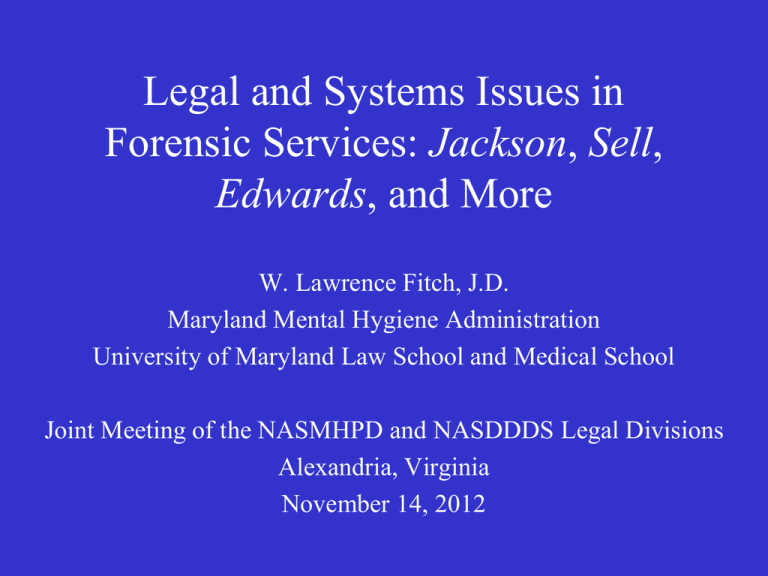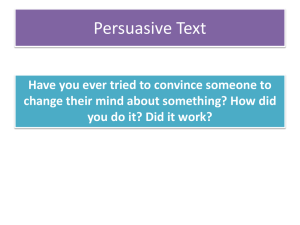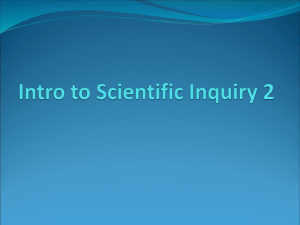
Legal and Systems Issues in
Forensic Services: Jackson, Sell,
Edwards, and More
W. Lawrence Fitch, J.D.
Maryland Mental Hygiene Administration
University of Maryland Law School and Medical School
Joint Meeting of the NASMHPD and NASDDDS Legal Divisions
Alexandria, Virginia
November 14, 2012
Background: State MH/DD Institutions
• 1955: 559,00 MH Patients
1967: 195,00 DD Residents
• 2012: 42,640 MH Patients
2005: 42,000 DD Residents (and going down)
• 45% of MH Patients “Forensic” (Committed by a
Criminal Court)
• 30% of Forensic Patients Committed as
Incompetent to Stand Trial (IST)
Background, Cont.
• LOS for Civil Patients (Nationally)
– Schizophrenia: 11 Days
– Bi-polar Disorder: 7.8 Days
– Depressive Disorder: 6.5 days
• LOS for Patients Committed as IST: 3-6 Months +
• In 1971, LOS for IST Patients Often Life
(McGarry)
Deinstitutionalization of Competency
Restoration Services
• Community Based Restoration
– Permitted by Law in 37 States
– 16 States Have Programs; Mostly New
– Small Percentage of Defendants: Often Juveniles Found
IST in Juvenile Court or Defendants with Cognitive
Disorders or Developmental Disabilities
– Most Adult IST Defendants Have Psychotic Disorders
– Community Placement Sometimes Follows Inpatient Stay:
Restoration or Disposition?
• Jail Based Restoration Services: AZ, GA, TX, VA
– Frustrates Misuse of CST to Circumvent Commitment
Jackson v. Indiana (US SCt, 1972)
• Theon Jackson: 27 Yr Old “Mentally Defective Deaf
Mute” Charged with 2 Purse Snatchings Totaling $9
• Found IST, Committed to Ind. DMH “Until CST”
• Attorney Seeks Reconsideration: No Evidence of MI; No
Hope for Restoration– “Life Sentence”
• State: Can’t Say He Won’t Become CST
• US SCt: Record Clear Jackson Not Restorable
Jackson, Cont.
• Question: Constitutional to Keep IST Defendants Under
Special Restoration Commitment Indefinitely?
• Baxstrom v. Herold (US SCt, 1966): Prisoners Committed
at End of Sentence Due Equal Protection
• If Differential Treatment Not Justified for Convicted
Offenders, Not Justified for Untriable Defendants:
Unrestorably IST Defendants Due Same (Equal)
Protections as Ordinary Civil Committees
• Due Process: Nature and Duration of Confinement Must be
Related to Its Purpose– Commitment to Restore the
Unrestorable
Holding in Jackson
• Defendant Committed as IST “Cannot be Held
More than the Reasonable Period of Time
Necessary to Determine Whether There is a
Substantial Likelihood that He Will Attain [CST]
in the Foreseeable Future”
• Defendant Must be Making Progress Toward
Restoration
• If Found Unrestorable, Defendant Must be Civilly
Committed or Released
Implementation of Jackson
• Maximum Period of IST Commitment (Bailey-Smith,
2010; 35 States)
– No Statutory Limit: 7 States (Though 4 Require Dangerousness for
Commitment)
– 30- 90 Days: 3 States
– 90 Days- 6 Months: 4 States
– 9 Months- 1 Year: 7 States
– 15 Months- 2 Years: 6 States
– 3 Years- 5 Years: 3 States
– Two-thirds of Maximum Sentence: 1 State
– Maximum Sentence: 2 States
• Note: 8 States Specify Lesser of Above or Maximum
Sentence
• Note: 4 States Allow Less Time for Misdemeanors (NY:
No Special Commitment of IST Misdemeanants)
Restrictions in Some States on Post-Jackson
Civil Commitment (Bailey- Smith, 2010)
• GA: Court Must Approve Release
• IN: Defendant Remains Hospitalized Until CST or
Charges Dismissed
• MN: Criminal Court Supervises Commitment for
3 Years
• TX: Criminal Court May Deny Release
• NM: Commitment for Maximum Sentence
Indiana v Davis (Ind S Ct, 2008)
• Question: Must charges be dismissed when def found
unrestorable and confined for maximum sentence?
• Def here IST for criminal recklessness (3 yr max sentence)
• 3 months later, hosp opines def unrestorable, initiates civil
commitment
• Though def civilly committed, charges still active and
court maintains oversight
• “Statute is silent” on status of IST commitment after
finding of unrestorability and civil commitment
Davis, con’t
• DMH believes because charges pending, court must
approve any release; Forensic Director says courts almost
never release these def’s
• Def requests dismissal of charges after 3 yrs (max
sentence)– Trial court grants motion, appeals court
reverses; on to the Ind S Ct
• S Ct reverses appeals court, orders dismissal of charges:
Unless state demonstrates legit interest in prosecution (e.g.,
to assure sex off registration), due process requires
dismissal where def unrestorable and max sentence
expired-- State has no legit interest in prosecuting this case
Davis, con’t
• But what about restrictions on civil commitment (requiring
court approval for release)? If charges have not been
dismissed, are these restrictions constitutional after def
found unrestorable?
– Language in the opinion (discussing Jackson) suggests
no: Remember, Jackson said differential treatment
violated equal protection
– But holding stops short– only requires dismissal of the
charges after def found unrestorable and confined for as
long as max sentence
Ohio v. Williams (OH Ct Apps, 2008)
• Another Jackson Case: Constitutionality of Law
that Permits Special, Court-ordered Commitment
of Unrestorably IST Def
• Ohio Law: If def unrestorably IST for certain
serious felonies and state proves by clear and
convincing evid that (i) def committed crime
charged (“factual guilt”) and (ii) def meets
heightened commitment standard, criminal court
may retain jurisdiction up to max sentence and
order commitment to state hospital
Williams, con’t
• Hospital must report periodically re def’s
competency and committability
• Court must approve release or movement to less
restrictive confinement; state forensic center must
weigh in if hosp makes proposal
• Commitment ends only when (i) court finds def no
longer committable, (ii) def restored to CST, or
(iii) max sentence expires-- then prosecutor may
seek ordinary civil commitment
Williams, con’t
• Def here unrestorably IST for rape, committed under
special statute; def appeals
• Ct Appeals Reverses:
-- Commitment violates equal protection: No reasonable
basis for more onerous release procedures (citing Jackson)
-- Commitment violates due process: Impermissible “end
run around Jackson”
-- Indictment must be dismissed when def found
unrestorable
-- Also, commitment here criminal, not civil, so if such a
proceeding were constitutional, def would be entitled to
criminal protections at “factual guilt” determination (right
to jury trial, proof beyond reasonable doubt, etc)
New Mexico v. Adonis (NM S Ct, 2008)
• Another Jackson case re Constitutionality of Law
Permitting Special Commitment of Unrestorably
IST Def’s … with very different outcome!
• NM law: If def unrestorably IST and state proves
crime charged (factual guilt) by clear and
convincing evid, court may commit def for pd of
time “equal to the max sentence” possible
• Def here unrestorably IST for murder, committed
under special statute for 30 yrs to life (penalty to
1st degree murder)
Adonis, con’t
• Def challenges commitment:
-- Denied right to jury trial and finding beyond a reas doubt,
citing Ring v AZ (req’d if proceeding may find facts
increasing sentence)
-- Evid didn’t support finding of “deliberate intention” to kill,
required for 1st degree murder
• Court denies Ring claim, finding that commitment is not
punishment (is civil), but agrees that evid insufficient to
show 1st degree murder-- remands case for re-commitment
consistent with finding of 2nd degree murder
• But What About Jackson? Def did not argue Jackson
violation!!??
Ray v Maryland (MD Ct of Apps, 2009)
• Question: May court deny dismissal of charges after
statutory period has expired?
• MD law: Charges must be dismissed if def IST for lesser
of the max sentence or 3 yrs (minor crime), 5 yrs (violent
crime), or 10 yrs (capital crime) unless prosecution shows
“ extraordinary cause” not to dismiss
• Def IST for attempted murder
• Def moves for dismissal after 5 yrs
– State argues def is highly dangerous (sends threatening
letters to victim and others)
– DMH opines def restorable if took Clozapine
Ray, con’t
• Trial court finds extraordinary cause (def dangerous and
restorable), denies motion to dismiss; def appeals
• Ct of Appeals: “Extraordinary cause” means “out of the
ordinary
• Q: Is it out of the ordinary for an IST def who maxes out to
be dangerous and restorable? No-- Def may not be
committed unless dangerous and can’t be retained if not
restorable; thus, no “extraordinary cause”
• NOTE: Dismissal of charges is “without prejudice ,” so
state may reinstitute charges….
Adams v. State of MD (MD Ct Apps 2012)
• MD Law: Charges Agst IST Def Dismissed
“Without Prejudice”
• Charges against Defendants Ray (from Ray v MD)
and Adams Dismissed at 5 Year Limit Without
Prejudice
• State Promptly Re-indicts both Defendants;
Neither Def Leaves Confinement
Adams, Cont.
• Question: May State Indefinititely Confine
IST Defendant by “Simply Re-indicting?”
• Court: No-- Re-indictment Requires “Good
Faith Belief that Defendant Has Become
Competent”
Is Strict Implementation of Jackson Realist?
• Consider that When Jackson Decided, Civil
Commitments Still Pretty Lengthy (250,000 State
Hosp Patients in 1972)
• Jackson Court May Have Assumed Most Def’s
Would Remain Hospitalized
• Experience Suggests if Extended Commitment
Not Likely Under Ordinary Civil Commitment,
Court Will Find a Way
• Is There Another Option?
Proposed Reform: ABA Criminal Justice/
Mental Health Standard 7- 4.13 (1986, to be
re-examined in 2013)
• If Def Unrestorably IST for “Felony Causing or
Seriously Threatening Serious Bodily Harm,”
• Trial of “Factual Guilt:” Defendant Has All Rights
Except Right Not to be Tried if IST
• If Factual Guilt Proven Beyond a Reasonable
Doubt, Def Subject to Commitment Under State’s
NGRI Commitment Law
• Your Thoughts?
Sell v. US (US SCt, 2003)
Involuntary Medication to Restore CST
Permissible if:
1. “Important Government Interest” at Stake
2. Involuntary Medication “Significantly Furthers”
That Interest
3. Involuntary Medication “Necessary” to Further
That Interest
4. The Medication Proposed is “Medically
Appropriate”
Sell: Important Government Interest
• Crime Sufficiently Serious
– Some States Consider Likely Sentence (e.g., Sentencing
Guidelines)
– Other States Consider Maximum Sentence
– Case by Case (6 Months Enough, 10 Years Not Enough)
• “Special Circumstances” May Diminish Govt’s
Interest
– How Much Time Def Confined Already
– That Medication Refusal Will Likely Result in a Lengthy
Hospital Stay, Diminishing Concerns That Def Will be
Released Without “Punishment”– Naïve Understanding of
Jackson (or Not So Naïve?)
Sell: Medication Will Further Gov’t Interest
• Medication “Substantially Likely” to Restore
Defendant’s CST
• Medication “Substantially Unlikely” to Have Side
Effects that Will Interefere Significantly with Def’s
Ability to Assist
• Court May (Must?) Inquire About Types of
Medications and Dosages (US v Evans, 4th Cir, 2005)
Sell: Medication Necessary to Restore CST
• Court Must Find That Any Alternative, Less
Intrusive Treatments Unlikely to Achieve Same
Result (e.g., Non-drug Therapies)
• Court Must Consider Less Intrusive Means for
Administering Medications (e.g., Court Order,
Backed by Contempt Power)
Sell: Medication Must Be Medically
Appropriate
• Court Must Consider Def’s Best Medical Interests
in Light of Medical Condition (Not Just
Likelihood of Producing CST)
• Again, Court May Inquire About Medication
Choices, Dosages, Effects, Side Effects
• In High Profile Cases, Expect a Battle of the
Experts
Sell: Other Grounds for Involuntary
Medication
• Sell Inquiry Not Necessary if Alternative, “Civil” Grounds
Available
– To Address “Dangerousness” (Ref. to Washington v Harper,
US SCt 1990)
– To Protect Def’s “Own Interests” Where Medication Refusal
Puts Health Gravely at Risk (Professional Judgment)
– Appointment of Guardian to Make Medication Decision for
Def Not Competent to Do So on Own
• Sell Suggests States Rule Out Alternative Grounds Before Using
Sell Approach (Suggests Courts Determine Whether Alternative
Grounds Tried First and, If Not, Why Not)
Do States Use Sell?
• Two Recent NASMHPD Surveys (Logan, Bailey Smith)
• 13 Responses
– 12 Relied No
– 1 Replied Yes (UT)
– IN Provides No right of IST Def’s to Refuse (Not Yet
Tested)
– In RI, if Def Refuses, State Certifies Def for Civil
Commitment, Where Involuntary Medication Allowed
– Note: The Feds and Some States (e.g., CA) Do Use Sell
– Note: In At Least 2 States That Replied No Above,
There are State Appellate Opinions Supporting Sell’s
Use
May States Use Sell Approach in the
Absence of a Sell Statute?
• Sell: Provides Constitutional Clearance
• But States May Provide Def’s with Greater Protection
Than Constitution Requires
• If State Law Prescribes Circumstances Under Which State
May Medicate Over Objection, May Courts Go Further
Simply Because Sell Says It Would Not Be
Unconstitutional to Do So?
• Some Appellate Courts Have Affirmed Sell’s Use in
Absence of Statute ( e.g., State ex rel. D.B., Tex AppTyler, 2007)
Final Thoughts on Sell
• Slobogin (Wash U L Rev, 2012): Sell Not Necessary
Because “Exceptions Swallow the Right”
– IST Overlaps Substantially with Incompetency to Make
Treatment Decisions
– Def’s Charged with Crimes Likely to be Seen as
Dangerous
• Suppose Defendant Likely Restorable with
Medications but Successfully Refuses?
– Court Should Find Def Unrestorable (Fitch)
– Def Cannot be Required to Waive One Right in Order to
Exercise Another
Competency to Represent Oneself
Background
• Sixth Amendment (1791): Right to counsel
• Powell (1932), Zerbst(1938), Gideon(1963): At
state expense if indigent
• Faretta v California (1975): Right to represent self
if competent to waive right to counsel (“intelligent
and voluntary” waiver)
Question: If Defendant is CST with
Counsel, is Defendant Competent to
Waive the Right to Counsel and
Proceed Pro Se?
Godinez v Moran (1993)
• Def charged with 3 counts 1st - degree murder, is
assigned counsel, pleads not guilty
• Def evaluated, found CST (but “very
depressed”— “may be inclined to exert less effort
towards his own defense”)
• Prosecution decides to seek death penalty
Godinez v Moran, Cont’
• Def asks to discharge counsel and change plea to
guilty– reason for waiver: to prevent presentation
of mitigating evid at sentencing
• Judges asks routine waiver questions, def gives
“largely monosyllabic answers”
• Judge accepts waiver (“knowing and intelligent”),
accepts guilty plea (given “freely and
voluntarily”)
• Def presents no mitigating evid, is sentenced to
Godinez v Moran, Cont’
• Post-conviction claim that def was incompetent to
represent self, denied due process
• 9th Circuit grants relief: competency to waive
counsel and plead guilty requires a higher level of
competency than CST: “capacity for reasoned
choice among the alternatives”
• Prosecution appeals to US Supreme Court
Godinez v Moran, Cont’
• S Ct reverses, reinstates conviction and sentence:
decision how to plead and whether to waive
counsel “no more complicated than the sum total
of decisions a def may be called upon to make
during course of trial [as required for CST]”
• Competency to waive counsel does not require
consideration of competency to represent self
Godinez v Moran, Cont’
• Dissent: Competency with counsel different from
competency without:
--“Person who is competent to play basketball
not thereby competent to play violin”
--“Def who is utterly incapable of conducting
own defense cannot be considered ‘competent’
to make such a decision, any more than a
person who chooses to leap out of a window in
the belief he can fly can be considered
‘competent’ to make such a choice”
Moran executed March 30,
1996
--Godinez v Moran decided 1993
--Colin Ferguson granted waiver of
counsel 1994: Moran in action
(Faretta or worse)
So, is Def Who is Competent
to Stand Trial with Counsel
(and therefore competent to
waive counsel) Competent to
Stand Trial without?
Indiana v Edwards (2008)
• Shoplifting gone awry: attempted murder,
theft, etc.
• IST restored to CST (though “still suffering
from MI”)
• Request to represent self denied: Though
CST, not “competent to defend himself”
Indiana v Edwards, Cont’
• Trial with counsel results in conviction; Edwards
appeals
• State appeals court reverses: Violation of right to
self representation
• Indiana Supreme Court finds “substantial basis to
agree with the trial court’s decision to require
counsel” but affirms Appeals Court, citing Faretta
and Godinez
Indiana v Edwards, Cont’
The Supremes Weigh In
• Trial court got it right
• Godinez distinguished: only dealt with
competency to waive-- no need to consider
competency to “conduct trial proceedings” b/c
defendant intended to plead guilty (But note that
Moran had responsibility for sentencing hearing)
Indiana v Edwards, Cont’
• So, may be defendant be CST with counsel but
incompetent to present case at trial? Supremes say
“Yes,” siding with trial judge
• CST standard refers to defendant’s capacity to
“consult with counsel” and “assist counsel in
preparing the defense”-- standard assumes
representation, thus inadequate to resolve question
of competency to represent self
Indiana v Edwards, Cont’
• Court cites MacArthur Adjudicative
Competence studies and APA brief: MI can
impair ability to “play significantly
expanded role required for self
representation even if he can play the lesser
role of represented defendant “
Indiana v Edwards, Cont’
• Question about dignity of the defendant: Right to
self representation “will not affirm the dignity of a
defendant who lacks the mental capacity to
conduct his defense without the assistance of
counsel”– Was Colin Ferguson dignified by his
presentation?
• Proceedings must not only be fair, “must appear to
be fair to all who observe them”
Indiana v Edwards, Cont’
• IMPORTANT NOTE: Court does not say judges
must require counsel for CST defendants who are
incompetent to represent self, only that they may
without violating defendant’s pro se rights-though dicta suggests trial of such a defendant
without representation may be suspect; another
remedy, one which affirms the defendant’s pro se
rights: find the defendant IST
Standard for Comptency to Represent
Self (or to Stand Trial without Counsel)
• Edwards Court declines to establish standard, though
indicates incompetency must be due to “severe mental
illness”– generalized difficulties as might make self
representation difficult for ordinary defendants not
enough
• Court rejects Indiana’s suggestion: “cannot
communicate coherently with the judge or jury”
• Trial judge’s call, considering the circumstances and
of the case and exercising sound discretion
Standard for Comptency to Represent
Self: Some Relevant Abilities
• Planning a meaningful defense
• Participating in voir dire
• Deciding what witnesses to call and what to ask
them
• Knowing when and how to make objections
• Organizing and presenting closing argument
Risk Assessment Technologies and
Their Significance for LOS in
Psychiatric Facilities
Risk Assessment: Applications
• Psychiatric Civil Commitment/ Release
• Commitment/ Release of NGRI’s
• Commitment/ Release of “Sexually Violent
Predators”
• Sentencing/ Parole of Convicted Offenders
Psychiatric Civil Commitment:
What’s the Legal Standard?
No, It’s Not Dangerousness!!
Psychiatric Civil Commitment
• Standard for Civil Commitment?
– Need for Treatment…
– To a Degree that the Symptoms of the Illness Requiring
Treatment Place the Individual at Risk of Harm to Self or
Others
• Role of Dangerousness in Commitment Law
– Beginning in the 1970’s
– To Place Limits on the State’s Authority to Commit People
Needing Treatment
– Not to Widen the Net to Include People Not Needing
Treatment
Use of Actuarials in Determining
Civil Committability: The Relevance
Requirement
• Evidence Admissible Only if Relevant
– Must be Material
– Must be Probative
• Are Actuarial Measures of Violence Risk
Relevant to Civil Commitment?
PCL-R
• Two Major Facets of Psychopathy
– I. Callous, Selfish, Remorseless Use of Others
– II. Chronically Unstable and Antisocial Lifestyle
• Selected Items in the PCL-R
–
–
–
–
–
Glibness/ Superficial Charm
Lying/ Conning/ Manipulative
Parasitic Lifestyle/ Failure to Accept Responsibility
Many Short-Term Marriages
Juvenile Delinquency/ Criminal Versatility
V-Rag
• Items on the V-Rag
–
–
–
–
–
–
–
–
–
–
Lived with Biological Parents Until 16
Elementary School Maladjustment
History of Alcohol Problems
Never Married
Criminal History Score
Young Age
Victim Gender, Injury
DSM Personality Disorder
DSM Schizophrenia: Negatively Correlated
PCL-R Score
HCR-20
• Historical Items
– Previous Violence; Young Age at First Violence
– Relationship Instability; Employment Problems
– Substance Use Problems; Major Mental Illness
– Psychopathy
– Early Maladjustment
– Personailty Disorder
• Clinical Items
– Lack of Insight; Negative Attitudes
– Active Symptoms of Major MI; Unresponsive to
Treatment
• Risk Management Items
– Plans Lack Feasibility
– Exposure to Destabilizers; Lack of Personal Support
– Non-compliance With Remediation Attempts; Stress
DMH Policy on Use of HCR-20
in Maryland
HCR-20 Findings of Increased
Risk May Not be Used in
Testimony at Commitment or
Release Hearings Unless the
Increased Risk is Directly
Attributable to Serious Mental
Illness
What About NGRI Commitments?
• Jones v. US (US SCt, 1983): NGRI Commitment
May be Different from Civil Commitment
• Foucha v. Louisiana (US SCt, 1992): But the
Standard for Commitment is the Same
– Dangerousness Alone Won’t Due-- Individual
Must be Dangerous Due to A Mental Disorder
– The Nature of Confinement Must be Related to
Its Purpose; The Purpose of Psychiatric
Hospitalization is Treatment of a Mental
Disorder
• Are the Actuarials Relevant?
So What About SVP Commitments?
• Laws for the Special Civil Commitment of Sex Offenders
Leaving Penal Confinement
• Commitment Standard: Sexual Dangerousness Due to a
Mental Abnormality or a Personality Disorder
• Though Stated Purpose is Treatment, No Requirement that
Offender Need Treatment (But See Kansas v Crane, US
SCt, 2002)
• Plethora of Assessment Instruments (Static-99, SORAG,
SAVRY, SVR-20)– Widely Used; Relevant?
Criminal Sentencing
• Purposes of Sentencing
– Retribution
– Incapacitation
– Deterrence
– Rehabilitation
• Determinate Sentencing Focuses on Retribution–
Is Violence Risk Relevant? Monahan: No!
• Indeterminate Sentencing Includes Consideration
of Incapacitation (Public Safety)– Violence Risk is
Relevant! (Though Maybe Not Reliable….)









